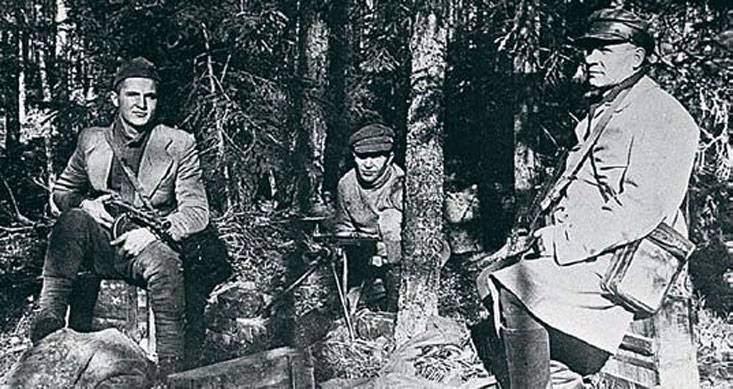Vilnius as a gift
17 March 1938 year. Warsaw presented an ultimatum to Lithuania to immediately establish diplomatic relations. She, we recall, refused them because of the Polish occupation since April 1919 of her primordial capital, Vilnius and the adjacent region. Warsaw hinted at the possible use of military force. Kaunas initially refused, recalling the annexation of the Vilna region. The USSR strongly supported Lithuania in this conflict. 18 March 1938, the then head of the NKID, Maxim Litvinov, told Polish Ambassador in Moscow Vatslav Grzybowski: “Despite the absence of a military alliance between Lithuania and the USSR, we are interested in preserving Lithuania’s independence and oppose the outbreak of war. Otherwise, the Soviet government denounces without warning the non-aggression pact (1932 year. - A. B.). And in the event of an armed attack on Lithuania will reserve freedom of action. ”
Thanks to the position of the USSR, the Baltic republic escaped the Polish occupation, and the diplomatic relations that caused the conflict were soon established, but, we emphasize, without Kaunas recognizing Polish sovereignty over the Vilna region. The Lithuanian side, both officially and behind the scenes, thanked Moscow for its support.
After a year and a half, September 17, the Red Army, joining the neighboring regions of Poland defeated by the Nazis, preempted the advance of the German troops. And on October 1939 in Moscow, a Soviet-Lithuanian agreement was signed on the transfer of Lithuania to Vilnius and the surrounding area. The then president of the republic, Antanas Smetona, in a telegram of thanks to Stalin and Molotov noted that it was the USSR that contributed to the reunification of the historical capital, which had been torn away from her, with Lithuania.
It is worth remembering that a little earlier, Berlin achieved a concession from Lithuania on almost the entire Baltic coast - Klaipeda and the Klaipeda region, immediately renamed Memelland. That was the official name of the region that belonged to Germany before 1919. The official guarantors of Lithuanian sovereignty in this region - the United Kingdom, France, Italy and Japan - did not react to the annexation. Soon, from Klaipeda deported to Lithuania all the "aliens" who settled in Memelland in 1922 – 1939. Berlin had similar plans for the neighboring Latvian Libau (Liepāja): it was planned to supplement Memelland from the north. An unexpected seizure by Italy of Albania and a sharp exacerbation of the situation on a section of the border near Danzig (Gdansk) - “no one’s” before its occupation in September of 1939-th prevented this from making this happen.

Lithuanian partisans Nikolai Bukinas, Andrei Trushkinas and Sergey Nevedomkis in a forest camp, September 1 1944.
As for the partisan movement in the Baltics, which, as 30 has already been arguing for, was purely anti-Soviet, this is, to put it mildly, a strong exaggeration.
Back in February, the Latvian Workers' Social Democratic Party (Latvijas Socialdemokratiska Stradnieku partija) was reinstated in Riga in Riga. She created underground cells, which for the most part collaborated with the anti-fascist resistance in the country. And only from August on 1943, the “pro-British” illegal Latvian Central Council (established in Riga a year earlier) began to form, following the example of the Polish Army of the regional militant nationalist groups operating under the slogan “Neither the Soviets nor the Nazis”. The “Kurelists” (by the name of the head, former General of the Latvian Army Janis Kurelis) had established contacts with the intelligence services of Great Britain and neutral Sweden, where almost all surviving militia fighters of the LCS fled to 1944. These groups were from the power of 1945, and in total in the Baltics in the Great Patriotic War there were more than 30 guerrilla groups (and organizations of members of the underground) totaling more than 60 thousand people. In the national composition of these formations, at least 25 percent accounted for Latvians, Lithuanians and Estonians. They fought both the Nazis and local collaborators, including the Forest Brothers. For example, the Soviet partisans and underground fighters - Estonians in 80-1941-m destroyed 1944 occupiers and their accomplices, destroyed 3300 garrisons derailed 10 trains, blew up and burned 11 road and railway bridges, 34 military warehouses, wrecking more than 13 steam locomotives (for more details - “The Struggle for the Soviet Baltic in the Great Patriotic War 50 – 1941”, Riga, “Liesma”, 1945).
It is worth recalling that the Wehrmacht Kurland grouping capitulated to 8 on May 1945 in front of the 130 in the Latvian Rifle Corps of the Red Army. In the liberation at the end of January of 1945 from the Nazis of Klaipeda and the adjacent area, the 29 of the Lithuanian Rifle Corps participated. And the defeat of the German troops in the Tallinn-Tartu operation of the Soviet troops in September of the 1944 determined the actions of the 8 of the Estonian rifle corps and the 7 of the Estonian rifle division of the Red Army.
The title of Hero of the Soviet Union was awarded to 1941 – 1948 15 Lithuanians, 12 Latvians, 9 Estonians (who fought in regular units, partisans and underground fighters). For merits in the fight against the Nazi occupiers and their accomplices over 15 thousands of Soviet citizens of the Baltic nationalities were awarded military orders and medals of the USSR.
The current Baltic lovers of political local history should be more careful with their own history ...
Information